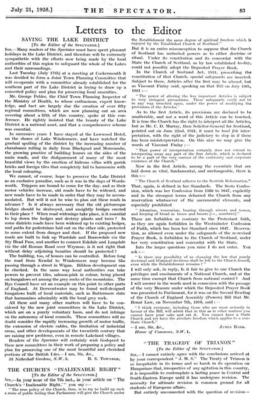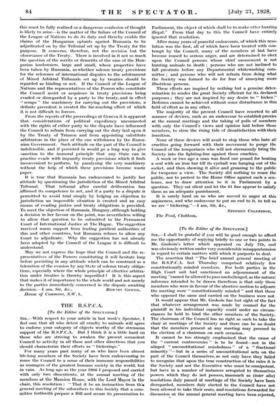" THE TRAGEDY OF TRIANON " [To the Editor of
the SPECTATOR.] Snt,—I cannot entirely agree with the conclusions arrived at by your correspondent " J. M. S." The Treaty of Trianon is so inequitable in its terms and so harsh in its operation on- Hungarians that, irrespective of any agitation in this country, it is impossible to contemplate a lasting peace in Central and South-Eastern Europe until it has undergone revision. The necessity for ultimate revision is common ground for all students of European affairs.
But entirely unconnected with the question of revision- this must be fully realized or a dangerous confusion of thought is likely to arise—is the matter of the failure of the Council of the League of Nations to do its duty and thereby enable the claims of the Hungarian optants against Rumania to be adjudicated on by the Tribunal set up by the Treaty for the purpose. It concerns, therefore, not the revision but the observance of the Treaty. There is involved in it not so much the question of the merits or demerits of the case of the Hun- garian landowners, large and small, whose properties have been taken by Rumania, as whether solemn treaty provisions for the reference of international disputes to the arbitrament of Mixed Arbitral Tribunals set up by treaties should be regarded as binding or not. If the Council of the League of ,Nations and the representatives of the Powers who constitute the Council assist or acquiesce in treaty provisions being evaded or disregarded by a party to the treaty, and in effect " scraps " the machinery for carrying out the provisions, a definite precedent is created the far-reaching effect of which it is not difficult to foresee.
From the reports of the proceedings at Geneva it is apparent that considerations of political expediency unconnected with the rights of either party to the dispute have influenced the Council to refrain from carrying out the duty laid upon it by the Treaty of Trianon and from appointing substitute arbitrators in the place of the one withdrawn by the Ruma- nian Government. Such attitude on the part of the Council is indefensible, and if persisted in would go a long way to give sanction to the immoral principle that any State can in practice evade with impunity treaty provisions which it finds inconvenient to perform, by paralysing the very machinery without the help of which these provisions become waste paper.
It is true that Rumania has endeavoured to justify her attitude by questioning the jurisdiction of the Mixed Arbitral Tribunal. That tribunal after careful deliberation has affirmed its competence to act, and if a party to a dispute is permitted to avoid trial simply by lodging an objection to jurisdiction an impossible situation is created and an easy means of evading justice and treaty obligations is provided. To meet the objection of Rumania, Hungary, although holding a decision in her favour on the point, was nevertheless willing to allow that question to be submitted to the Permanent Court of International Justice at The Hague. The suggestion received warm support from leading juridical authorities of this and other countries, but Rumania refuses to allow any Court to adjudicate. Why the suggestion has not already been adopted by the Council of the League it is difficult to understand.
May we not express the hope that the Council and the re- presentatives of the Powers constituting it will hesitate long before persisting in any attitude which can be construed as a toleration of the evasion by any State of solemn treaty obliga- tions, especially where the whole principle of effective arbitra- tion under treaties is thereby imperilled ? It is this aspect that makes it of importance to the whole world and not merely to the parties immediately concerned in the dispute awaiting





















































 Previous page
Previous page